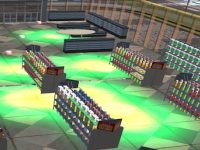Save Time and Reduce Costs with NoSupports™ Metal Printing
Metal 3D printing is a high energy process in which it is possible for unmanaged heat and stress to build up and impact part quality, this guide reviews how to apply NoSupports to a hot end section of a larger turbomachinery part.

May 2, 2022
Metal additive manufacturing (AM) makes it possible to produce high performing components that defy conventional manufacturing limitations. By enabling the production of strong, lightweight, performance-optimized parts, AM is a top choice for bringing function-driven designs to life.
Yet every manufacturing process has its nuances, and for metal AM this is the need for certain geometries to be printed with support structures. Despite being a powder-based process, metal printing is not considered self-supporting due to the interplay of high-powered lasers on the metal materials available. Depending on the specifics of different design features and their orientation, supports may be recommended to ensure higher quality outcomes.
The need for supports is not universal, however, and the strategies within this guide offer ways to print successfully without them. These strategies are particularly helpful for the production of internal features, where removing support structures would be damaging or destructive to the part.
They can also be used to increase productivity and accelerate production time by reducing or eliminating post-processing steps tied to support removal. In addition to explaining the various strategies currently available for NoSupports™ metal printing, this guide presents a step-by-step methodology for how to apply NoSupports to a hot end section of a larger turbomachinery part.
Fill out the information below to download the resource.
Latest News







